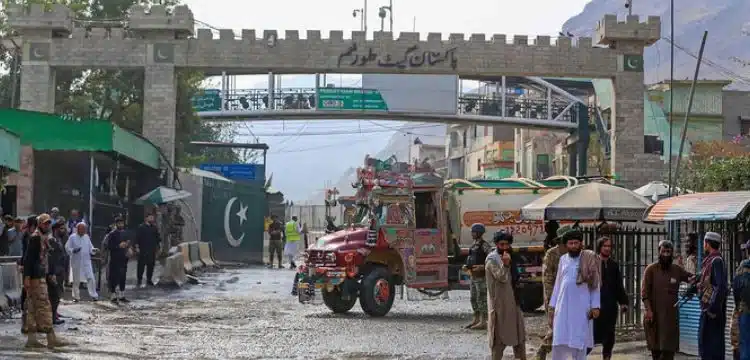[vc_row][vc_column][vc_column_text dp_text_size=”size-4″]
The Torkham border crossing, a pivotal link between Pakistan and Afghanistan, witnessed a resumption of operations on Tuesday following extensive discussions between officials from both nations. The border closure, which endured for over a week, primarily affected truckers lacking the requisite visas for cross-border travel. In response to the heightened security concerns, Pakistani authorities enforced more stringent controls, necessitating visas and passports for drivers on both sides.
However, the ground reality revealed a significant challenge, as many Afghan nationals did not possess the required travel documents. The resulting impasse led to a temporary closure of the Torkham border crossing, creating a backlog of waiting trucks.
Read more: Afghan Truckers Now Require Mandatory Visas At Torkham Crossing
After successful negotiations between Pakistani and Afghan officials, the border was reopened, bringing relief to the multitude of trucks awaiting passage. While an official press release is anticipated to provide comprehensive details, preliminary reports suggest a crucial development in the discussions: a temporary agreement until March 31. According to these reports, during this interim period, Pakistani and Afghan drivers may traverse the border without the mandatory visa and passport requirements.
The consensus reached between the officials further outlines a future protocol. Effective from April 1st, both a visa and a passport will become mandatory prerequisites for cross-border travel. This phased approach aims to facilitate a smoother transition, allowing affected parties to adjust to the updated requirements.
The strained ties between Pakistan and Afghanistan have been a prominent backdrop to recent developments. Islamabad initiated a substantial crackdown on illegal immigrants, setting a deadline of November 1st for them to leave or face deportation. This stern measure by Pakistan was justified on grounds of economic and security challenges, emphasizing the need for stringent immigration policies.
However, Afghan officials have vehemently denied any involvement in subversive activities that may have contributed to Pakistan’s decision. The divergent perspectives on the issue have created tensions between the two nations, with broader implications for diplomatic relations and regional stability.
The reopening of the Torkham border crossing represents a significant diplomatic breakthrough, showcasing the willingness of both countries to engage in constructive dialogue to address mutual concerns. The temporary relaxation of visa and passport requirements until March 31 reflects a pragmatic approach, allowing for a transitional period during which affected individuals can align with the new regulations.
As both nations navigate the complexities of border management and immigration policies, the collaborative efforts demonstrated in resolving the Torkham border issue offer a glimpse of diplomatic cooperation. The forthcoming official press release is anticipated to provide more detailed insights into the specific terms and conditions agreed upon during the negotiations, shedding light on the intricacies of this bilateral understanding.
[/vc_column_text][/vc_column][/vc_row]











